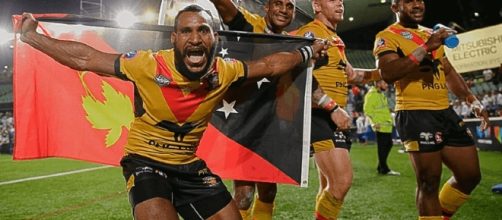The good people of PNG know how to create atmosphere like no other! I would love to see them have a side in the NRL.🇵🇬🏉#RLWC2017 pic.twitter.com/Yi6DjaNamR
— Barry Harden-Upman (@TheBHU_NRL) October 29, 2017
England rugby league fans would have been extremely disappointed at their team's loss against Australia last Friday despite having a team littered with stars and with the reigning Man of Steel in their ranks. Meanwhile, the most ardent supporters and Rugby League World Cup followers woke in the early hours of Saturday morning to watch co-hosts Papua New Guinea demolish a Welsh side managed by legendary Super League coach John Kear.
The match itself demonstrated the strength, power and physical capabilities of the PNG players, however, the fixture had so much more to it than being just a game of rugby league.
The Oil Search National Stadium in Port Moresby, the capital of the island nation, has been the home of the Kumuls - a nickname given to represent the country's national symbol (the bird of paradise) - since 1975. And, on a bright sunny afternoon, the stadium was awash with expectant spectators sporting the vibrant yellow, red and black colours of their heroes' jerseys.
Electric atmosphere
Before the main event started, traditional Papua New Guinean dancers performed in their native dress, complete with stunning face and body paint that showcased their historic customs to an audience perhaps previously ignorant of the history of the country.
With native chants enhancing the carnival-like atmosphere even further British viewers were, indeed, treated to a spectacular cacophony of colour and noise.
The atmosphere was spectacular and like no other on the rugby league planet; a cauldron of noise, the Papua New Guinean people live, breathe and eat the sport. As the only nation in the World Cup with rugby league as their main sport, the passion and enthusiasm amongst the sell-out crowd was such a pleasure to witness. While the country's hierarchy has been criticised recently for its treatment of refugees on one of its islands, the tight-knit community of Papua New Guinea rugby league came together in a wonderful show of solidarity.
WATCH: Incredible noise from local crowd as PNG thrash Wales. https://t.co/UVGYkS25TN #rlwc2017 pic.twitter.com/3ffVOtK4HD
— Sporting News AU (@sportingnewsau) October 28, 2017
PNG and Rugby League go hand-in-hand
Nonetheless, this was not surprising; the Papua New Guinea team host a highly-anticipated fixture against an Australia team - the so-called Prime Minister's XIII which is made up of players in teams that have not qualified for the NRL Finals - each year in Port Moresby. It is so popular that thousands of people are unable to gain entry. Because the people are so determined and excited to see the game, many climb onto the stadium roof or up trees outside the ground in order to see the match.
The raucous enthusiasm for the World Cup, therefore, was a foregone conclusion.
Throughout the whole tournament, it will become evident that the Papua New Guinean people win, lose, or draw will never cease throwing their full support behind the players whom they laud almost like deities. Indeed, one has to just wind the clock back to the 2000 World Cup when PNG was knocked out by Wales in the quarter-finals. Despite the loss, over 50,000 ardent supporters welcomed the team as they landed at Port Moresby Airport later days later. Perhaps, England fans can learn a thing or two from the people of this brilliant island nation.
Second to none
Rugby League does really have its home in Papua New Guinea.
And, no matter what Australian and New Zealand fans drum up in terms of feeling inside the stadia on their respective game days, it cannot and will not match that of Port Moresby when the Papua New Guineans are in full voice and spirit.


